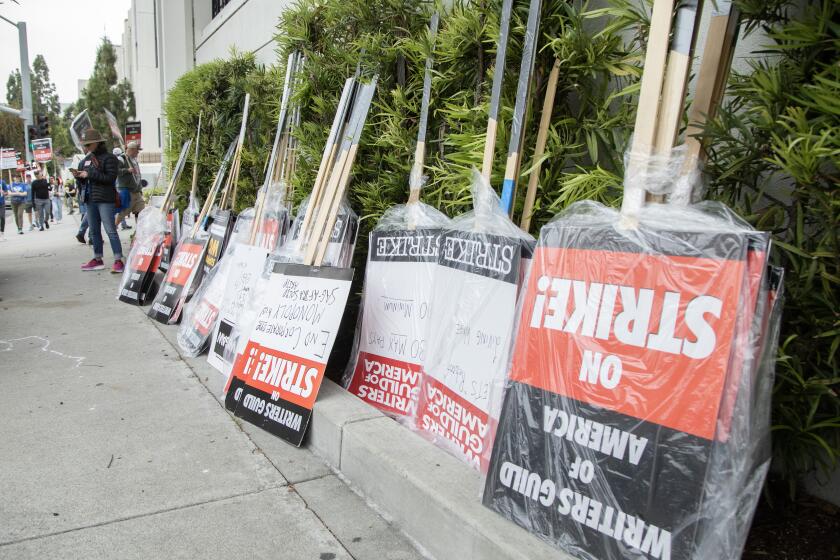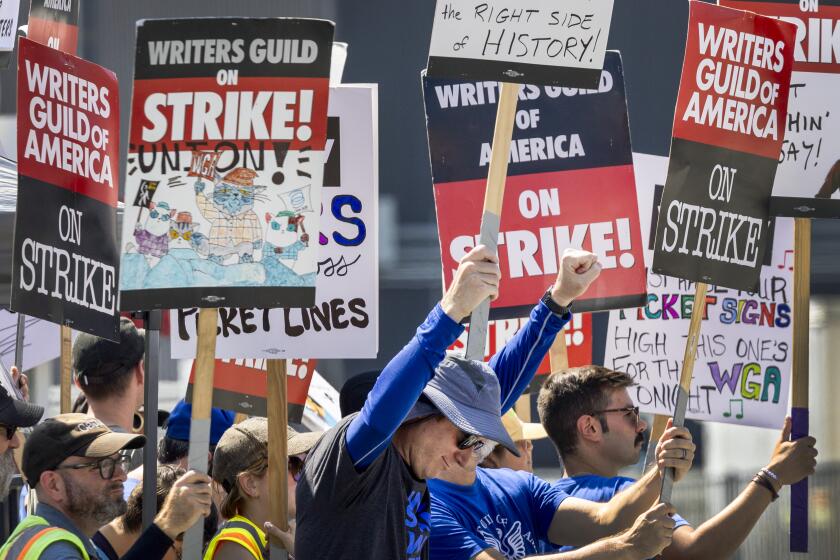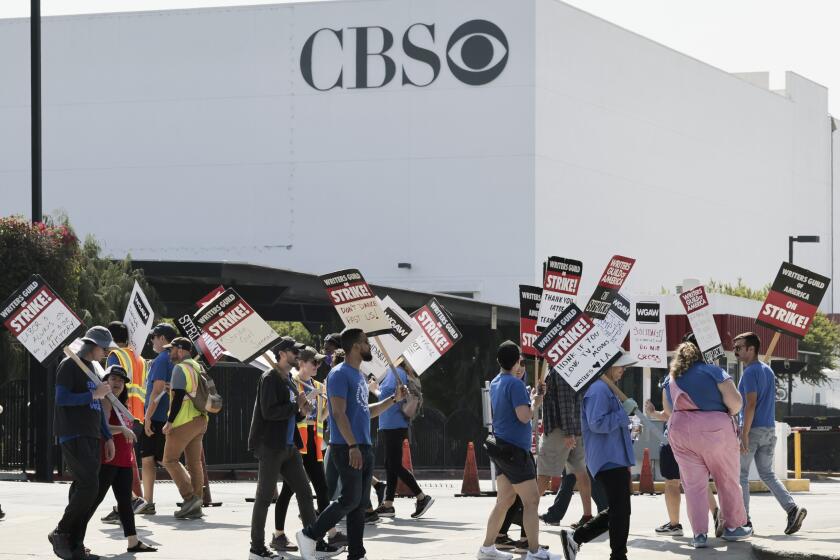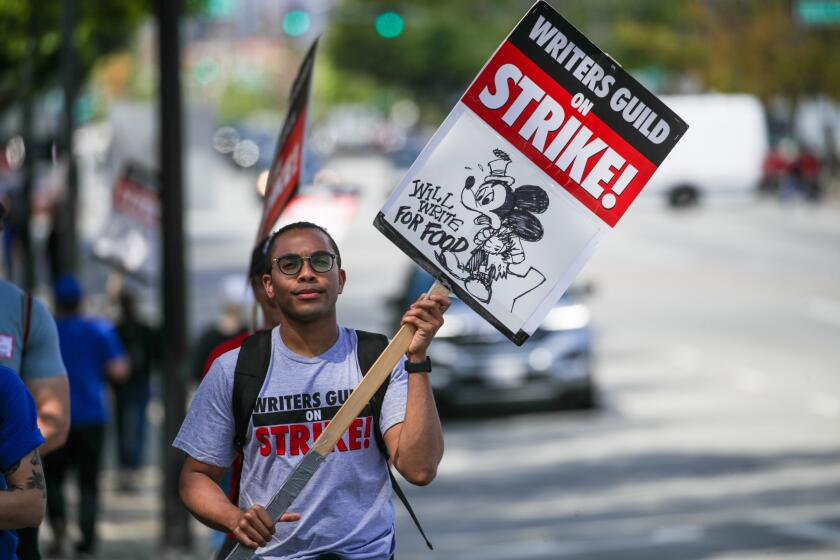WGA deal brings tears of joy to Hollywood writers, and relief to a city scarred by strikes
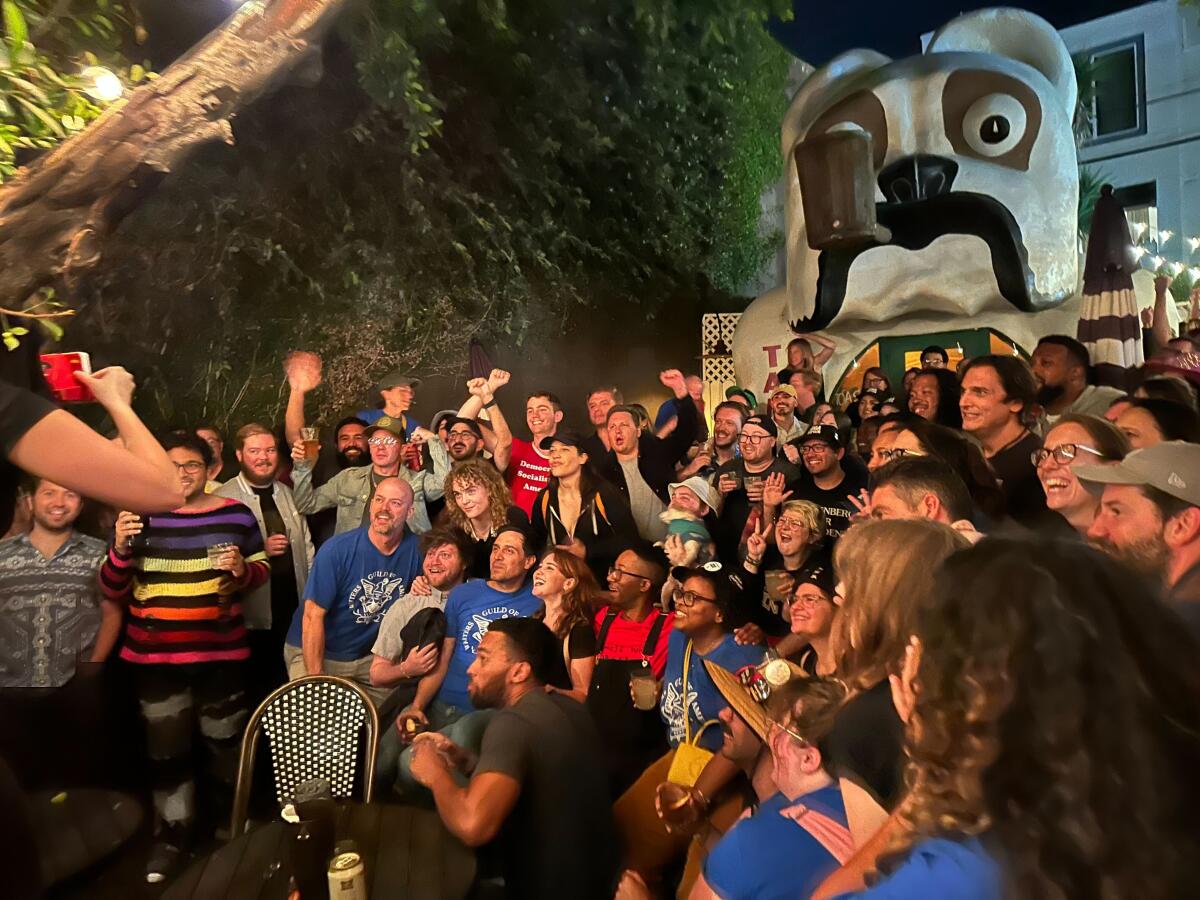
- Share via
Hollywood writers expressed joy, exhaustion and gratitude after the Writers Guild of America and the major studios finally reached a tentative agreement that would end a months-long strike.
The scribes behind “The Marvelous Mrs. Maisel,” “Gotham,” “Chicago Fire,” “Abbott Elementary” and other titles were quick to celebrate. Los Angeles Mayor Karen Bass and California Gov. Gavin Newsom weighed in, and at least one rabbi interrupted her service Sunday to share the latest news in a strike that has sent devastating ripples across the regional economy.
But perhaps the biggest sigh of relief came from the writers themselves.
“No, I’m really crying right now,” Alex Zaragoza — a writer on Freevee’s “Primo” who also contributes to De Los for the Los Angeles Times — posted on X. “This strike has been so hard. Necessary and invigorating, and really f— hard. But we did it! We fought together. We didn’t take any s— together.”
Later, in a reference to her guild’s negotiating committee, she added: “Thank you, wholeheartedly, to our Negcom team. Unions forever. WGA forever.”
Negotiators representing the Writers Guild of America and major studios reached a tentative agreement for a new labor contract, ending a writers’ strike that began in early May.
Sal Calleros — a writer, executive producer and WGA strike captain known for FX’s “Snowfall” and ABC’s “The Good Doctor” — told The Times that he hopes the tentative deal between the WGA and the Alliance of Motion Picture and Television Producers will improve the lives of the next generation of writers.
“This was about the people who I mentor,” Calleros said Sunday.
“This was for the folks who are coming up behind me — that they have the opportunity to make a living. ... So if we reached a good agreement on those big areas concerning residuals, AI, the number of writers in the room ... then the folks behind us will then have a shot to make this an actual career.”
Calleros also gave a shout-out to all the allies who brought food to the picket lines, honked their car horns in support and amplified the WGA’s message.
“All of that just fueled us,” Calleros said. “Honestly, I was there for the last strike, and the energy that we experienced this time around was not present back then. This was a very different ballgame. And I think it’s gonna be a very different ballgame moving forward as well.”
WGA member Aiko Little also emphasized the opportunities this tentative deal could provide for up-and-coming writers — particularly as the streaming landscape continues to evolve.
“What was once considered new media is now everyone’s life and blood,” said Little, vice chair of the WGA’s Native American and Indigenous Writers Committee and a staff writer on the upcoming Amazon series “Get It.”
“So to have new protections and to be able to pave a better way for the next set of generations, that’s incredible. It’s absolutely necessary. And moving forward, there’s going to be so much more that we ... can advocate for.”
Cameron Ali Fay, co-chair of the WGA’s Middle Eastern Writers Committee and screenwriter for the Paramount comedy “Brother Nature,” was at the beach with his wife and kids when he heard that a tentative settlement had been reached. In that moment, he felt like he could “breathe for the first time.”
He is hoping for a greater cuts of streaming profits and residuals, as well as more consistent pay.
“Everyone had been on pins and needles,” Fay said. “For 146 days, we were out there picketing and believing that we had this collective power, but until this deal came through ... there was a little doubt.”
Fay and his co-chair, Paiman Kalayeh, explained that because the Middle Eastern Writers Committee is a relatively new addition to the WGA, many of its members did not get the chance to unite in person until they met on the picket lines.
An important sticking point of the work stoppage for Kalayeh — a TV writer known for DC’s “Legends of Tomorrow” and Fox’s “The Cleveland Show” — was the rise of so-called mini rooms. Members of the WGA have criticized studios for hiring and allegedly underpaying small groups of writers to work on multiple episodes of a show that may or may not get picked up.
Fewer writers working on shows “would really cut off a pipeline to diverse voices,” Kalayeh said.
Maintaining the momentum in terms of diversity and inclusion is also a big priority for Jonathon Roessler, who pointed out that Native American and Indigenous writers “don’t even make a piece of the pie” chart when it comes to representation.
“The room size is so important, because most of the time ... it’s these underrepresented groups that get cut out of the rooms in favor of other writers,” said Roessler, co-chair of the Native American and Indigenous Writers Committee and a writer on Netflix’s “My Life With the Walter Boys.”
“That’s what I hope that gets remembered going forward — is that there are so many voices, and we met them ... every day in the picket line.”
The letter was posted as an announcement to the WGAContract 2023 website used by the Guild to communicate with its members.
Caroline Renard of Disney’s “Secrets of Sulphur Springs” posted that she felt like she had just emerged from a war. “Holding it down for my team since motherf— January. Getting us organized in case of a strike even way before May and now we here b—!”
James Alexander of Disney Channel’s “Hailey’s On It!” posted: “If you picketed. If you donated. If you retweeted/reposted voices, messages, links. If you dropped off water, food, supplies. If you drove by and honked. If you reached out to check on us. If you’re a worker who’s since went on strike. If you supported. This is your win, too.”
In a statement Sunday, Bass said she was “hopeful” that the AMPTP and the performers’ union, SAG-AFTRA, also could come to an agreement in light of the tentative deal reached by the studios and the WGA. The Hollywood actors’ strike is ongoing.
The Writers Guild of America and major studios represented by the AMPTP were nearing a deal on Saturday, according to people familiar with the matter.
“This historic strike impacted so many across Los Angeles and across the nation,” Bass said.
“Now, we must focus on getting the entertainment industry, and all the small businesses that depend on it, back on their feet and stronger than ever before.”
Newsom focused his remarks solely on the WGA strike, declaring, “California’s entertainment industry would not be what it is today without our world class writers.
“For over 100 days, 11,000 writers went on strike over existential threats to their careers and livelihoods — expressing real concerns over the stress and anxiety workers are feeling,” Newsom said.
“I am grateful that the two sides have come together to reach an agreement that benefits all parties involved, and can put a major piece of California’s economy back to work.”
The WGA released an official statement to its members calling the tentative agreement “exceptional” and touting the “meaningful gains and protections” it is poised to secure for writers.
“What we have won in this contract ... is due to the willingness of this membership to exercise its power, to demonstrate its solidarity, to walk side-by-side, to endure the pain and uncertainty of the past 146 days,” the memo reads.
“It is the leverage generated by your strike, in concert with the extraordinary support of our union siblings, that finally brought the companies back to the table to make a deal.”
Like most WGA members, many Black writers widely support the strike but fear there will be a contraction of projects and opportunities once Hollywood gets back to work.
The strike is not officially over, and WGA members have not been cleared to return to work just yet, but the WGA negotiating committee did confirm that picketing has been suspended.
“Instead, if you are able, we encourage you to join the SAG-AFTRA picket lines this week,” the committee said.
“This historical deal with the AMPTP couldn’t have come at a better time,” read a statement Monday from Christina Piña, chair of the WGA’s Latinx Writers Committee, and Jorge Rivera, the vice chair, who noted the deal came during Hispanic Heritage Month.
“It’s been a very long time coming,” added Tracy Held, vice chair of the WGA’s Asian American Writers Committee, in a statement to The Times. “I’m going to continue picketing with our colleagues at SAG-AFTRA until they get a deal they’re happy with.”
Word of the deal spread swiftly. On Sunday, in a Fairfax district Kol Nidre service marking the eve of Yom Kippur, a rabbi delivered the news to worshipers.
“Apparently, while we have been davening there’s been a tentative agreement that’s been reached and the writers’ strike seems to be ending,” the rabbi told her flock, creating an unexpectedly joyful moment in the otherwise somber proceedings.
Hundreds of white-clad congregants — many of whom work in film and television — burst into applause as she spoke.
Celebrations of all sorts began breaking out across the city. Shortly before 9:30 p.m. Sunday, chants of “WGA! WGA!” erupted from the packed patio of the North Hollywood bar Idle Hour, where hundreds of writers poured in.
Many sported blue WGA shirts emblazoned with the union logo and hoisted fists and drinks in the air, cheering and hugging and snapping group photos to commemorate the night.
Writer and producer Mark Rozeman, a strike captain at the NBCUniversal lot whose credits include “The Good Doctor,” was among the first to arrive at Idle Hour as word of celebrations across the city swiftly spread. Looking around with a grin, he described the feeling: “Euphoric.”
Rozeman had been driving when he received an email alerting strike captains that the announcement was imminent. “I pulled over to the side of the road to read it and make sure that was right. … It was like a weight got lifted.”
As Rozeman spoke, someone in the bar crowd shouted, “We won! We won!” and was quickly answered with whoops and cheers.
“It’s been a long time coming and we knew it would come eventually,” Rozeman said, “but to see it in writing feels very surreal and we’re all just incredibly happy.”
Times staff writers Jen Yamato, Wendy Lee, Meg James, Julia Wick, Jonah Valdez, Jevon Phillips, Dakota Smith and Carlos De Loera contributed to this report.
More to Read
Inside the business of entertainment
The Wide Shot brings you news, analysis and insights on everything from streaming wars to production — and what it all means for the future.
You may occasionally receive promotional content from the Los Angeles Times.
